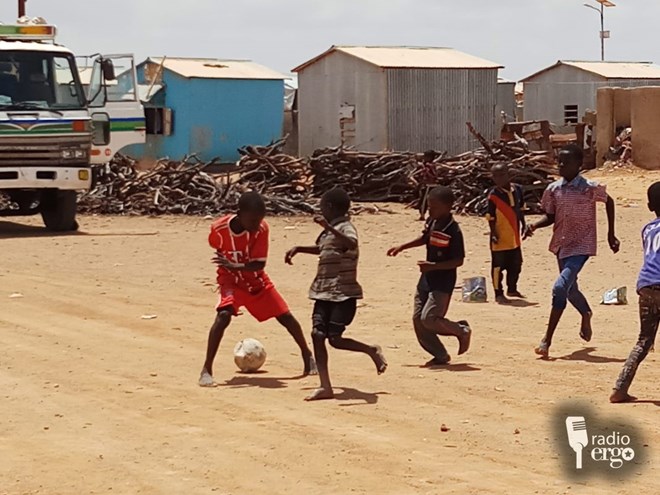
Tuesday October 27, 2020

Qaar ka mid ah carruurta barakacayaasha xerada Jawole ee Garoowe oo kubad ciyaaraya xilli carruurta kale waxbarasho ku jirto/Cabdiraxmaan Maxamed/Ergo
(ERGO) – Authorities in the Somali state of Puntland say they have seized 324 trafficked children since the start of the year in various towns and cities.
Mohamed Abdirisaq Hantiile, the director general of Puntland’s Ministry of Women and Family Affairs, told Radio Ergo that the children included some who had been abducted from their families, and others who had been given up by their families believing they would get rewarding jobs.
The children were mostly under the age of 15. Around 150 of them were picked up in the port city of Bossaso.
“The main reasons for child trafficking is to subject them to forced labour, to harvest their body organs to sell to people in critical health conditions, or for sexual exploitation. Most of these children leave by their own will, or are accompanied by their parents in order to migrate to Arab countries bordering us. Sometimes, parents who reach Arab countries via illegal migration request their children at home to be smuggled over to join them there,” the director general said.The children are normally taken by the police to one of the 11 rescue centres supported by UNICEF in Bossaso, Galkayo, Garowe, Baran, Boame, Galdogob and Burtinle, until they can be reunited with their parents.
Fatuma Ahmed, a resident of Mogadishu, was reunited with her daughter Amal in September after a five year separation.
Amal was taken away at night when she was eight by a female relative from Bossaso. Fatuma said the relative assured her that Amal would go to school and be well taken care of until old enough to get a well-paid job.
However, it emerged that Amal was being badly treated and beaten in an IDP camp, where she was put to work doing domestic chores. Neighbours reported the case and Amal was taken to a child rescue centre, where her mother was able to find her.
Fatuma, who is from a poor family and has seven children, warned other parents not to entrust their children to anyone.
The Bari regional police commander, Hussein Ali Mahamud, said police use various means to find children who have been trafficked.
“Some are identified by the public and others are nabbed at checkpoints. The public inform us of the presence of children who are not from the neighborhood, or if they see people without children suddenly having children with them, or those who are passing through. We then move in and seize such children,” he said.
The ministry engages in often lengthy processes to identify the children brought to the rescue centres. Public announcements are made of lost and found child, in order to trace their families.
According to the authorities, poverty and unemployment are major factors that lead parents to be duped by crooks claiming that their children will be given jobs and money.
However, the director general of the ministry issued a stern warning that child labour is illegal.
“Parents need to be reminded that child labour, child trafficking, or organ trafficking is prohibited. This also violates children’s rights and human rights,” Mohamed Abdirisaq Hantiile said.
A number of convictions have been brought against people arrested for trafficking children or found with ‘stolen children’ in various cities. Most of those convicted were women, according to the police.
Most of the children involved originate from Mogadishu, Jowhar, Beletweyn, and Afgoye.